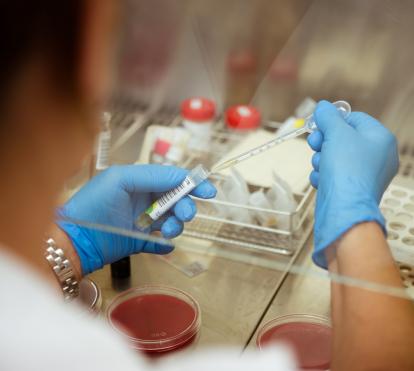
The irsiCaixa Foundation organises the 4th International Symposium on HIV Eradication at the Hospital Universitari Germans Trias i Pujol
14.11.03
5 minutes readOn 14 November the irsiCaixa Foundation will host the 4th International Symposium on HIV Eradication which will present, among other recent findings, the first results concerning the therapeutic vaccine for patients already infected by the human immunodeficiency virus. The symposium will feature the participation of 20 world-renowned researchers, such as Drs Boucher, Autran, Pantaleo, Kuritzkes and Lori. Organised by Dr Clotet, director of the irsiCaixa Foundation, the Symposium has become a key event for doctors and research specialists from around the world, who attend it with the purpose of learning about the latest advances in both molecular biology and its direct application to clinical practice.Those attending this year's Symposium will be particularly interested in its focus on the development of the therapeutic vaccine for patients infected by the virus. Drs Autran, Pantaleo and Lori will present the latest results obtained in this area. Achieving an effective vaccine model still remains a very complicated task, due to the rapid mutability of HIV (thousands of times faster than that of the influenza virus). Nonetheless, certain projects are already underway and will be presented in Barcelona.Drs Kuritzkes and Schapiro will speak about resistance to antiretroviral drugs. Special attention will be given to the mechanisms that trigger the development of resistance to T20, a drug that inhibits the fusion of the virus with cell membranes. This is a major step forward in treating patients in the advanced stages of the disease.This Symposium will also present the latest results from the research projects carried out at the Retrovirology Laboratory of the irsiCaixa Foundation, directed by Dr Clotet. These projects include viral fusion and HIV pathogenesis, interferences in HIV replication by small RNA molecules and the clinical utility of antiretroviral treatment interruption and immune reconstitution. Drs Esté, Martínez de la Sierra and Ruiz will address these topics. The irsiCaixa FoundationLocated at the Hospital Universitari Germans Trias i Pujol in Badalona, in the province of Barcelona, and directed by Dr Bonaventura Clotet, the irsiCaixa Foundation was established by ”la Caixa” Foundation and the Ministry of Health of the Government of Catalonia in January 1995. Its purpose is to carry out medical research in the fields of health sciences and epidemiology, particularly in the area of acquired immunodeficiency syndrome (AIDS). Thirty-five scientists currently work at this centre. These professionals are grouped into four basic lines of research: clinical retrovirology, headed by Dr Lídia Ruiz; basic molecular biology, headed by Dr Miguel Ángel Martínez de la Sierra; applied molecular biology, headed by Dr José Andrés Esté, and the most recent, immunopathogeny, headed by Dr Margarida Bofill. The irsiCaixa Retrovirology Laboratory has numerous research projects underway at present. These are financed by different Spanish and European institutions.Moreover, since December 2001 irsiCaixa has had a new Retrovirology Laboratory, the first facility of this type in Catalonia in terms of size and the scope of its research. The laboratory specialises in retrovirus research, especially the human immunodeficiency virus (HIV) and the hepatitis B and C viruses. By visiting the irsiCaixa Foundation's website www.irsiCaixa.org, the user can become acquainted with the latest research findings on HIV, consult a complete bibliography of AIDS publications, and formulate questions for the irsiCaixa research team. Here one can also find information on an ample range of grants and job opportunities for students of this field, in addition to links to the leading AIDS websites and to the institutions and organisations that strive to eradicate the virus.”La Caixa” Foundation and AIDSAIDS is of primary importance in the activities and programmes of ”la Caixa” Foundation. In addition to compiling research through the irsiCaixa Laboratory, the Foundation promotes initiatives aimed at awareness, training and prevention, especially among young people. ”La Caixa” Foundation has based itself on this premise since 1993, the year it published the work Sida. Els fets. L'esperança (AIDS. Facts. Hope) by Luc Montaigner. Later, in 1994, it set up the educational programme for students and teachers entitled "Sida. SABER AJUDA" ("AIDS. KNOWING HELPS"). Since its creation, 10,000 copies have been released. The aim of "Sida. SABER AJUDA" is to foster a more open approach to this disease in the educational community. With the irruption of the Internet as a tool for both work and communication, the Foundation created a website to complement the programme: www.sidasaberajuda.com. This is part of the Educalia virtual educational community.In 1999 ”la Caixa” Foundation launched the AIDS prevention campaign "Talking about AIDS with Our Children", in conjunction with the Ministry of Health and Social Security of the Government of Catalonia and the Ministry of Health and Consumption, through the Secretariat of the National AIDS Plan. Aimed at families with children under 15 years of age, this campaign sought to set proper guidelines for approaching matters such as sexuality and drugs as naturally and effectively as possible. ”La Caixa” Foundation also has an interactive exhibition on AIDS and the immune system, which seeks to explain the scientific basics of AIDS in a manner that is clear and particularly appealing to young people. The exhibition was opened in 1998, has toured 36 cities up to the present, and has received 540,000 visitors. www.fundacio.lacaixa.es